|
|
|
Sort Order |
|
|
|
Items / Page
|
|
|
|
|
|
|
| Srl | Item |
| 1 |
ID:
095467
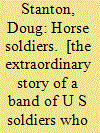

|
|
|
|
|
| Publication |
New York, Scribner, 2009.
|
| Description |
2009
|
| Standard Number |
9781416580515, hbk
|
|
|
|
|
|
|
|
|
|
|
|
Copies: C:1/I:0,R:0,Q:0
Circulation
| Accession# | Call# | Current Location | Status | Policy | Location |
| 054889 | 958.1047/STA 054889 | Main | On Shelf | General | |
|
|
|
|
| 2 |
ID:
153757
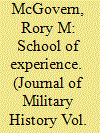

|
|
|
|
|
| Summary/Abstract |
At the end of a distinguished career, George W. Goethals completed the construction of the Panama Canal (1907–1914) and managed logistics for the U.S. Army in the final year of World War I. This article examines Goethals’s professional development prior to his arrival in Panama in 1907. It finds that Goethals was a product of an unsystematic developmental model that privileged experiential learning above all else, and that his successful development was more a function of talent, personal connections, and chance than of institutional design or formal training and education.
|
|
|
|
|
|
|
|
|
|
|
|
|
|
|
|
| 3 |
ID:
125339
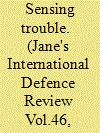

|
|
|
|
|
| Publication |
2013.
|
| Summary/Abstract |
A number of developments and new products among unattended ground sensors (UGS) and associated surveillance systems were in evidence at the association of the US army (AUSA) exhibition in Washington DC in October.
|
|
|
|
|
|
|
|
|
|
|
|
|
|
|
|
| 4 |
ID:
083734
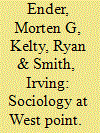

|
|
|
|
|
| Publication |
2008.
|
| Summary/Abstract |
Sociology and the Sociology Program at the United States Military Academy at West Point, New York, are described. Grounded in the academy's mission of educating and inspiring future leaders of character, this article focuses on the history of the Sociology Program, alignment with American Sociological Association standards, sociodemographics of cadet sociology majors, recent graduates, the curriculum, extracurricular activities, and the sociology faculty and their productivity. The Sociology Program has made significant progress in multiple areas while concomitantly being handicapped in other areas. The conclusion addresses the significance of social science in military officer education
|
|
|
|
|
|
|
|
|
|
|
|
|
|
|
|
| 5 |
ID:
165356
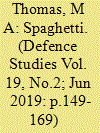

|
|
|
|
|
| Summary/Abstract |
In the mid-2000s, the United States Army was embroiled in counterinsurgency missions in Iraq and Afghanistan that required deeper understanding of local social systems. The Army turned to systems thinking and design thinking to model and understand the world, define problems, and develop approaches to strategic and operational challenges. However, the Army’s approach as expressed in publications and doctrine encourages the development of complicated, unsupported, and unfalsifiable hypotheses. The risk is that the Army will act on incorrect assumptions and develop plans that are fragile.
|
|
|
|
|
|
|
|
|
|
|
|
|
|
|
|
| 6 |
ID:
087677


|
|
|
|
|
| Publication |
2009.
|
| Summary/Abstract |
After the withdrawal of units of the U.S. Army from the Soviet Far East in 1919-20 in wake of the abortive anti-Bolshevik campaign launched by the administration of President Woodrow Wilson, the American military maintained a watchful eye on the growth and development of the Red Army. This interest in the Red Army can be seen in the articles that appeared in the Infantry Journal and other military journals during the 1920s that evaluated the capabilities of the Russian Army of the 1920s, the Soviet system of government, and Bolshevism in general. While the majority of Army leaders busied themselves with the absorption of the operational and tactical lessons of the recently concluded World War (1917-1918), other, more thoughtful officers wrote about and discussed both the Imperial Russian and Red [i.e., Soviet] armies in articles published in the Infantry Journal during the 1920s.
|
|
|
|
|
|
|
|
|
|
|
|
|
|
|
|
| 7 |
ID:
044512
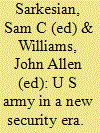

|
|
|
|
|
| Publication |
Boulder, Lynne Rienner Publishers, 1990.
|
| Description |
xii, 314p.
|
| Standard Number |
1555871917
|
|
|
|
|
|
|
|
|
|
|
|
Copies: C:1/I:0,R:0,Q:0
Circulation
| Accession# | Call# | Current Location | Status | Policy | Location |
| 032747 | 355.033/SAR 032747 | Main | On Shelf | General | |
|
|
|
|
| 8 |
ID:
016658
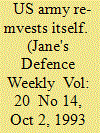

|
|
|
|
|
| Publication |
Oct 2, 1993.
|
| Description |
23-26
|
|
|
|
|
|
|
|
|
|
|
|
|
|
|
|
| 9 |
ID:
179196


|
|
|
|
|
| Summary/Abstract |
This article examines post-Cold War debates over the U.S. Army’s participation in peacekeeping operations. Peacekeeping meant different things to policy-makers, army leaders, public intellectuals, and those who served on such missions. Army leaders were generally not enthusiastic about these operations but recognized they were indicative of future trends. Peacekeepers accepted the role, even if they struggled to understand how to navigate the gray zone between peace and war; political commentators sought to use peacekeeping missions to advance their own causes. Participants in these debates articulated not only their thoughts on peacekeeping, but radically different visions of what they wanted the American soldier of the 21st century to be.
|
|
|
|
|
|
|
|
|
|
|
|
|
|
|
|
|
|
|
|
|